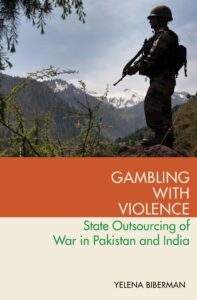I am an associate professor of political science at Skidmore College and Wilson China Fellow at the Woodrow Wilson International Center for Scholars, Kissinger Institute on China and the United States. I am also a new voice at the Andrew W. Marshall Foundation, nonresident senior fellow at the Atlantic Council’s South Asia Center, and associate at Harvard University’s Davis Center.

I received my B.A. in International Relations from Wellesley College, M.A. in Regional Studies from Harvard University, and M.A. and Ph.D. in Political Science from Brown University. I have also worked as a journalist in Moscow, Russia.
My research encompasses three main areas:
- Technology and unconventional conflict, e.g. biotechnology, proxy
- South Asian security, e.g. Kashmir conflict, Afghanistan, great power competition
- Ideas and leadership
Email address: ybiberma[at]skidmore.edu
 My book, Gambling with Violence: State Outsourcing of War in Pakistan and India, was published by Oxford University Press in 2019. It is available on Amazon.
My book, Gambling with Violence: State Outsourcing of War in Pakistan and India, was published by Oxford University Press in 2019. It is available on Amazon.
We know that outsourcing violence is a hard decision for states, and yet we do not fully understand the how, why and, equally importantly, between whom. Biberman’s excellent study combines a balance of interest framework with in-depth accounts to significantly improve our understanding.
Stathis N. Kalyvas, Gladstone Professor of Government, University of Oxford
This is a fascinating, carefully-researched, and theoretically supple study of the conditions under which states forge alliances with nonstate actors in civil wars. The book will be of considerable interest to scholars of South Asia, counterinsurgency, and civil wars.
Sumit Ganguly, Distinguished Professor of Political Science and Rabindranath Tagore Chair in Indian Cultures and Civilizations, Indiana University-Bloomington
Yelena Biberman offers an important new argument about the sources of alliances between governments and non-state armed groups. Combining a novel typology, clear theoretical argument, and detailed comparisons in South Asia and beyond, this work makes a valuable contribution to our understanding of state-armed group relations in the contemporary world.
Paul Staniland, Associate Professor of Political Science, University of Chicago
